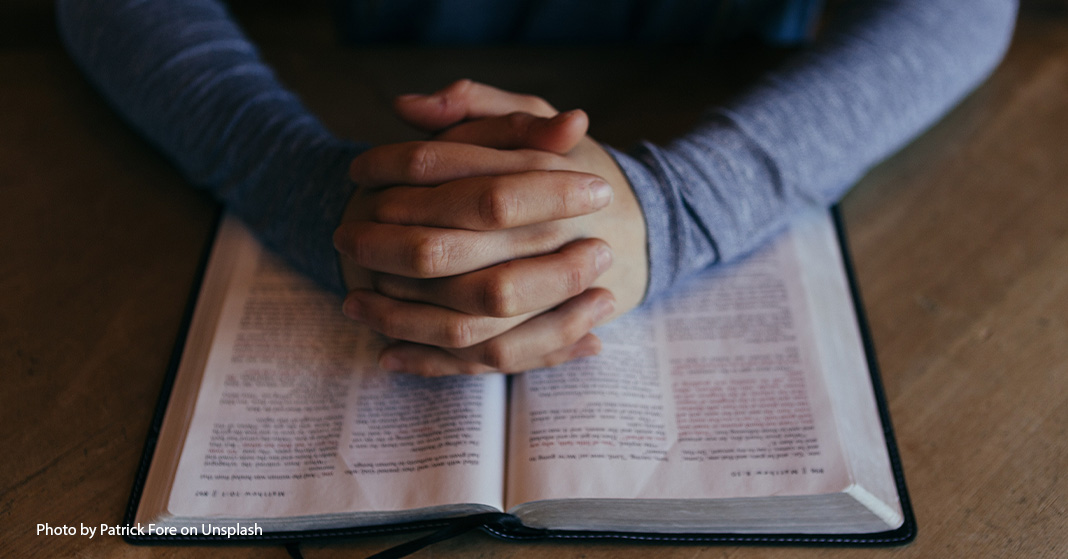
2020 has been quite a year. January 1, 2021, may be the most anticipated New Year’s Day since Y2K. Many of us are just so ready for this long year to end. We want to put the stress and the struggle behind us and start over on January 1. As relatable as this feeling may be, though, it doesn’t support the gratitude we should be giving to God for the opportunities and growth we have had this year. But how can you even begin to feel grateful for a year that seems like nothing but hard times?
gratitude
A Thankfulness Project

During the holiday season, we often try to be more thankful. With Thanksgiving in November and Christmas in December, it’s easy to spend two months out of the year being grateful for God’s grace and His gifts to us. But what about the rest of the year? It’s not that we aren’t thankful during the other ten months. But when you’re not actively thinking about and pursuing a certain mindset, it can go by the wayside. Sure, you’ve taught your children to say “thank you,” and you demonstrate that same thankfulness in your own life. But there’s a difference between reflexively saying “thank you” and being grateful enough to recognize the daily gifts God gives us and to thank Him for them as they come.
For example, not long ago I told a friend that my life had become a series of unfortunate events. My air conditioner had died with two months of summer left. Repairs would cost a pretty penny I couldn’t afford to spend. This was just one of the “unfortunate” events, and not even the most expensive one. I had a whole list of problems. But then I stopped and listed out all the blessings I could think of from the year and found that they greatly outnumbered the unfortunate things. It’s easy to devalue God’s daily blessings to us when all we’re looking at is the negatives. So I have a couple of challenges for you.
• Be Mindful about Being Thankful
I don’t have to tell you why you should be thankful. For many of us, however, gratitude is a reflex. We’re grateful when someone gives us something or does something for us. We don’t even have to think about it. But 1 Thessalonians 5:18 tells us, “In every thing give thanks: for this is the will of God in Christ Jesus concerning you.” In everything give thanks. I should have been grateful when my AC died. It’s definitely not an automatic response to be grateful when you have no AC during a South Carolina summer.
But if you take the time to think about the things you don’t want to be grateful for, you can see how they can be blessings in disguise. Even if the only thing your trial teaches you is that His grace is sufficient for you (2 Corinthians 12:9), you can be grateful for that. It may take some work, and you may need to reset some of the default settings in your heart, but it is possible to see how God is blessing you when you go through an “unfortunate” event.
• Start a Year-Long Thankfulness Project
If you really want to focus on thankfulness for the entire year, you’re going to need to turn it into a habit. Find some way to record the daily blessings you experience, whether the blessing is a safe field trip or a friend’s support during a hard time. You can fill a jar with slips of paper covered in blessings, or you can dedicate a journal to your family’s blessings. You could even start a OneNote notebook of blessings. When the jar is full, or you run out of pages in the journal, or you just need to remember God’s blessings, reread what you’ve put down. Then empty out the jar, get a new journal, open a new OneNote file, and start over.
Worry can’t tear you down if you’re buried in blessings!
Why Be Thankful?

“Thank you” are two of the first words we parents teach our children to say. Even before our daughters could talk, we taught them the sign for “thank you” in sign language. It’s important to train our children to express gratitude for the things they receive. But it’s also equally vital to teach them why we should be thankful because it’s more than just a matter of using good manners. If we can lay a biblical foundation for thankfulness while they’re young, we will help them develop a habit of gratitude for the rest of their lives.
A Few Reasons to Be Thankful
So why should we be thankful, and why should we teach our children to be thankful? Here are just a few reasons—by no means is this an exhaustive list.
- God commands it. Several times throughout Scripture the Lord instructs us to give thanks, and of course whenever He gives us a command, we should obey because we love Him (Psalm 50:14; 105:1; 107:8; Colossians 1:3; 2:7; 3:17; 4:2).
- Gratitude is God’s will for us. Probably 1 Thessalonians 5:18 immediately comes to mind: “In everything give thanks, for this is the will of God in Christ Jesus concerning you.” Many Christians want to know God’s will for their lives, and He tells us some very specific things that are always His will for us. Gratitude is one of them. God makes it very clear that thankfulness is always His will for our lives, no matter what our circumstances.
- Gratitude is evidence of the Holy Spirit indwelling us. It’s one of the marks of a true believer. If we profess salvation in Jesus Christ, our lives will be characterized by a thankful attitude. When we submit ourselves to the control of the Holy Spirit, He produces the fruit of gratefulness in our lives (Galatians 5:22).
- Gratitude is a choice. Our children need to learn that they can choose to give thanks even when they don’t feel like it. As parents, we must learn this ourselves so we can teach them to follow our example. How often do we find ourselves complaining? Do we give God praise only when things go our way? Do we thank Him for trials as well as blessings? These are a few important questions to ask ourselves as we strive to help our children learn true biblical thankfulness.
No Thanks
Our Christian character cannot be complete without thankfulness. Faith apart from gratitude becomes empty and powerless. Love apart from gratitude will disintegrate under adversity and discouragement. Sacrificial giving apart from gratitude will sour into resentment. A British pastor, John Henry Jowett, once said, “Every virtue divorced from thankfulness is maimed and limps along the spiritual road.” In short, we can’t be the Christians God wants us to be without it! Now is the time to cultivate gratitude in our families so we can grow “unto the measure of the stature of the fullness of Christ” (Ephesians 4:13).
• • • • •
Jennifer is a pastor’s wife and mom of two young girls and loves homeschooling them. During her own twelve years of being homeschooled, Jennifer developed a passion for reading and writing. She earned a bachelor’s degree in creative writing and relishes writing during her free time.
The Twelve Days of Thanksgiving
 Are you looking for a new way to celebrate Thanksgiving together as a family? Use this guide to enrich the Thanksgiving experience and build a culture of gratitude in your home, starting a little over a week or so before the holiday itself. If you like, you can download and print this Twelve Days of Thanksgiving poster to hang on your fridge or on a wall in your homeschool room to go over with your kids each day. You can even turn it into a song and sing it to the tune of the familiar Christmas carol.
Are you looking for a new way to celebrate Thanksgiving together as a family? Use this guide to enrich the Thanksgiving experience and build a culture of gratitude in your home, starting a little over a week or so before the holiday itself. If you like, you can download and print this Twelve Days of Thanksgiving poster to hang on your fridge or on a wall in your homeschool room to go over with your kids each day. You can even turn it into a song and sing it to the tune of the familiar Christmas carol.
“On the first day of Thanksgiving, the Lord God gave to me . . .”
One Beautiful Creation
Start your family’s days of Thanksgiving with the big picture—the beautiful world God made for human beings to live in. How can we show God we’re grateful for this planet? Talk to your kids about how they can be good stewards of the world and appreciate its beauty.
Two Family Pets
Does your family have a pet? Ask your children to think about how your pet(s) add value to your life. If you don’t have a pet, consider pets they enjoy at friends’ or relatives’ homes. How can your kids show love to some of the special animals God has placed in their lives? Treats, an extra-long walk, playtime, petting, or some soft words of affection are all great ways to show love to your family pet.
Three Fun Toys
Play is one way that children can glorify God! It’s part of what they’re meant to do as they grow and develop. Ask your kids to select three of their favorite toys and thank God for those items. To enrich the experience, discuss the origins or makers of some of the toys.
Four Friendships Given
Fellow church members, neighbors, homeschool co-op pals, sports teammates—your children’s lives are full of friends. Have each child compose a list of his or her four closest friends. They can send each friend a quick email or note, make a phone call or Skype call, or drop by for a visit. Encourage your kids to thank these people for their presence in your family’s life.
Five Senses Sound
Encourage your children to think about their five senses of hearing, taste, touch, smell, and sight. For which of those five senses are they the most grateful? Do you know anyone who lacks one of those five senses? How can you show love to that person today?
Six Public Servants
Who are the helpers in your community? Talk to your kids about the important roles of firemen, policemen, the mayor, road crews, mail carriers, and garbage pickup teams, among others. All of these people keep your town or city functional and beautiful. How can you thank them today?
Seven Favorite Foods
This is “favorite food” day! Create a list for each child, featuring his or her seven favorite foods. Choose one food from each list that you can all enjoy; and be sure to thank God specifically for those delicious treats!
Eight Books for Reading
Today is a wonderful day for reading! Ask each child to select eight favorite books; then read one or two from each stack! Maybe your kids would enjoy writing a thank-you note to an author or illustrator, expressing their gratefulness for a favorite story or novel.
Nine Crafts for Making
God gave us creative ability! Celebrate that gift today by having your kids select their favorite art supplies—crayons, pencils, googly eyes, glitter glue, craft sticks, and so on. Using those items, create nine different Thanksgiving-themed pieces of art! And thank God for art and self-expression as you work on the projects.
Ten Songs for Singing
Music is a beautiful part of God’s creation, from the songs of the birds to the ability humans have to create rhythm and melody. Talk to your children about music today! What are the favorite musical styles in your household? Favorite songs or hymns? Create a playlist and enjoy the beauty of music together.
Eleven Games for Playing
Break out the board games! Have your kids choose some of their favorite board games or card games and play them together. Don’t forget to include games of pretend too—role-playing games are a natural and exciting part of child development.
Twelve Loved Ones Caring
Today, your kids can be thankful for each other. Parents, grandparents, aunts, uncles, cousins—you may have trouble limiting this list to twelve, and that’s OK! As your kids think of more and more people who love them, they’ll realize on a deeper level how much they have to be thankful for—on Thanksgiving Day and every day.
• • • • •
Rebecca is a work-at-home freelance writer, novelist, wife, and the mom of two bright-eyed little ones. She credits her success in writing and her love of books to her own mom, who homeschooled three kids from pre-K through high school.
A Default Setting of Gratitude

Have you ever had to change your phone back to its default settings? Usually this happens when you’ve used and filled your phone to the point that it begins to malfunction; a reset to default settings often fixes whatever hiccups or problems it may have picked up. Remove all the extra noise and clutter of your customizations, and you restore the phone to a state of greater digital purity.
What if we took time to reset the focus of our hearts—a way to return to a default setting of renewed thinking and greater gratitude?
The Slide into Self-Pity
Left to itself, even a redeemed heart tends to drift towards self-pity and complaining. When it comes to giving thanks, it is easy to rehearse the good things—health, family, provisions. Yet too often we fail to express gratitude because our minds are taken up with the people and situations that trouble us.
To change our default setting to gratitude, we need to begin by thanking God for the things that bother us, not just the ones that we enjoy. Tough situations are often God’s gifts to reveal and change some unsanctified part of our hearts.
Sinking or Swimming?
One summer I was particularly unhappy with God because He prevented me from participating in the Christian camp where I longed to work. Instead, He gave me the opportunity to teach preschoolers how to swim. Day after day, under the scorching Phoenix sun, I was trying to get screaming toddlers to enjoy blowing bubbles and putting their faces in cold water.
Torn between their fear of the water and their desire for independence and control, they would push away, thrash around, or clamp onto me—even pinching me with their little toes. After a lesson or two, they had relaxed a bit and were delighted to let me bounce them around while I made motorboat noises or pretended to be a human washing machine. Eventually they learned that swimming lessons were great fun, that the water would hold them up, and that I would not let them drown.
Week after week, God gave me new students who screamed and cried and pinched. Finally I realized that God was trying to show me what I looked like to Him. I had my heart set on a specific ministry that was not open to me. I could continue my adult version of the toddler tantrum, or I could relax and trust Him to teach me how to stay afloat and actually enjoy the ministry He had given me.
The Bigger Plan
Once I understood that, I was able to identify with the children and thank God for them. They were showing me what I looked like as well as giving me insight into God Himself. I, a relative stranger, wanted to teach these kids the skills they needed to survive, and I wanted them to enjoy themselves too. Would God my Father want any less for me? So I surrendered my anger and went back to a default setting of thankfulness.
During the time I was working in aquatics, I renewed all my certifications as a Red Cross instructor for swimming, lifeguarding, CPR, and first aid. Later, those credentials gained me a place of ministry for the entire next decade at the very camp where I had wanted to work that summer.
God’s ways are above ours. We may never understand His methods, but we can always trust His motives. To reset and refresh our hearts, we have to clear out the clutter of busyness, worry, and self-pity. It’s time to go back and fix our minds on God’s truth and rest in a state of gratitude.
Several Bible studies published by JourneyForth are about topics Esther mentions in this post. Check out No Matter What You Can Rejoice, A Life Surrendered, and Refresh Our Hearts.